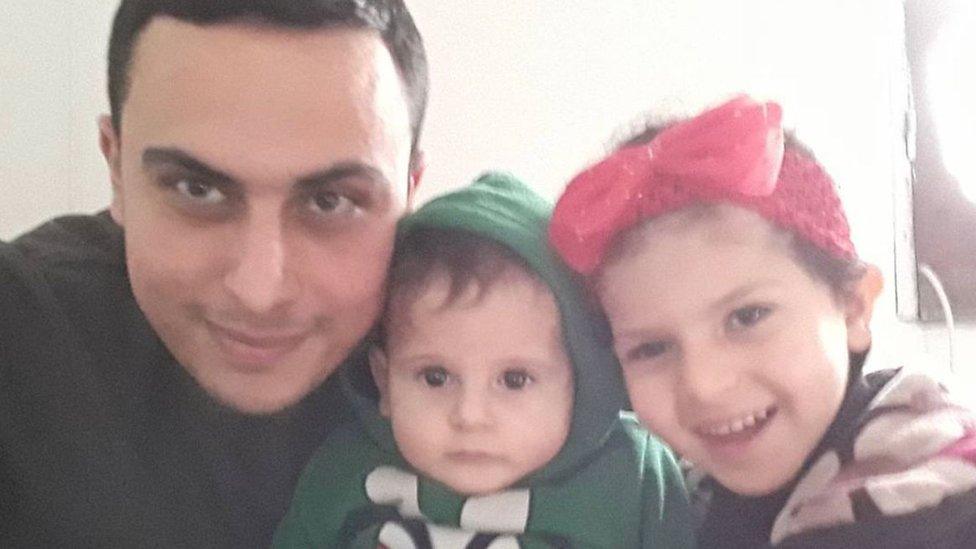British Jews are 'full of fear, like I've never seen before'
- Published
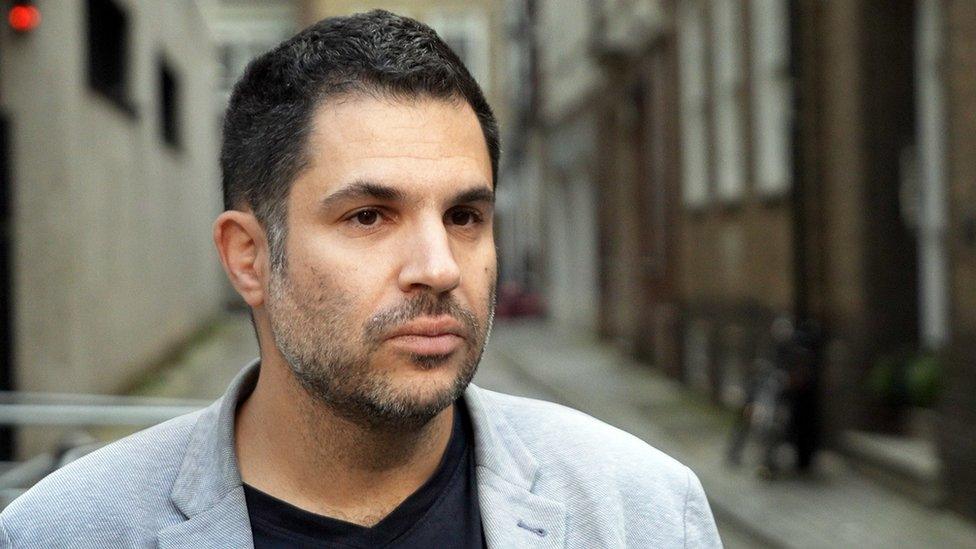
"The fears are never ending at this point," says Justin Cohen, news editor and co-publisher of Jewish News
"The Jewish community at the moment is full of dread, full of fear, like I've never seen before," says Justin Cohen, news editor and co-publisher of Jewish News.
He talks of this anxiety playing out with a backdrop of intense trauma caused by the Hamas killings and kidnappings on 7 October.
More than 70% of British Jews have family living in Israel and 90% have visited the country at least once, according to the Institute for Jewish Policy Research.
But the fact the Metropolitan Police reported a 15-fold increase in antisemitic incidents over the past three weeks, when compared with the same period last year, means hatred has been at the forefront of the minds of many.
"If people who are so boiling over with rage in these demos see Jewish people as inextricably linked with Israel, they will inevitably target those Jewish people. The fears are never-ending at this point," says Mr Cohen.
The demonstrations in the UK, attended by tens of thousands of people calling for an end to Israel's bombing of Gaza, have been viewed by him as hostile, threatening and unsettling.
In the most recent marches, he points to some being filmed calling for "intifada", the term given to violent Palestinian uprisings.
"We've seen calls for an intifada where, in the past, suicide bombings have targeted civilians, in cafes and restaurants and in nightclubs. Whether it's one person saying this stuff or 10 or 10,000, the chilling effect on British Jews is the same," says Mr Cohen
Although protest organisers insist the focus has been on Israel's massive bombing campaign in Gaza - and that antisemitism has not played a part - that is not how many British Jews see the marches.
"It's chilling. It's upsetting. And it makes you feel unsafe in the place that you call home," says Londoner Benjamin Bell, 41, of the size of the pro-Palestinian gatherings.
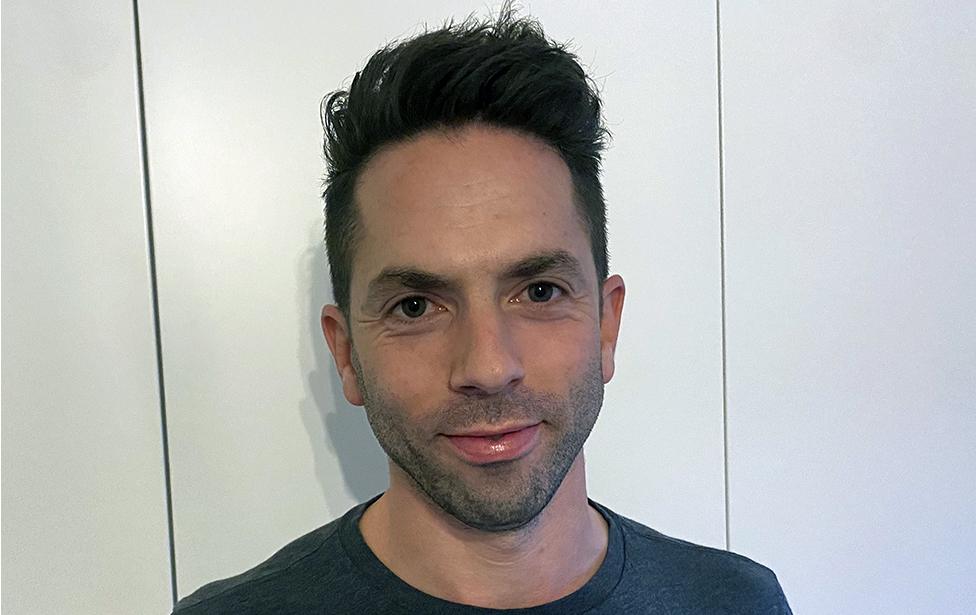
"A lot of social media content is stirring up hatred," says Benjamin Bell
In the immediate aftermath of the Hamas attacks, Mr Bell wrote a blog post that went viral, external in which he publicly expressed his Jewish identity, after years of being cautious about doing so, because of concerns about antisemitism. He talked of wearing a star of David pendant for the first time since his bar mitzvah.
Three weeks later, Mr Bell says he is once again having to weigh up whether he wears that pendant depending on the situation.
"Unfortunately a lot of social media content is stirring up hatred and making people feel that the place that they call home may not be safe," he says.
Mr Bell talks of Jewish friends feeling anxious about antisemitism, particularly at work where they are worried about expressing support for Israel.
Although he was born and raised in the UK, he says he was profoundly affected by the killings and kidnappings in Israel.
"The Holocaust cast a long shadow over the Jewish spirit and we feel that the state of Israel provides that sanctity, that safe haven, that last resort - it goes to the very heart of my being," he says.
It is why Mr Bell says he feels unnerved by the demonstrations and particularly by the use of slogans like "from the river to the sea, Palestine will be free," referring to the River Jordan and the Mediterranean Sea. He feels it can only mean the destruction of the Israeli state in its current form.
The Palestine Solidarity Campaign, which helps organise the demonstrations, contests this interpretation of that particular chant, saying the slogan refers to "the right of all Palestinians to freedom, equality and justice".
Activists also point to the make up of the pro-Palestinian protests as evidence they are not antisemitic.
"There are hundreds of Jews on the demonstration. In fact, I've never experienced the more beautiful energy. I saw no hate, just a kind of a wonderful caring for humanity," says Alexei Sayle who is both Jewish and also a patron of the Palestine Solidarity Campaign.
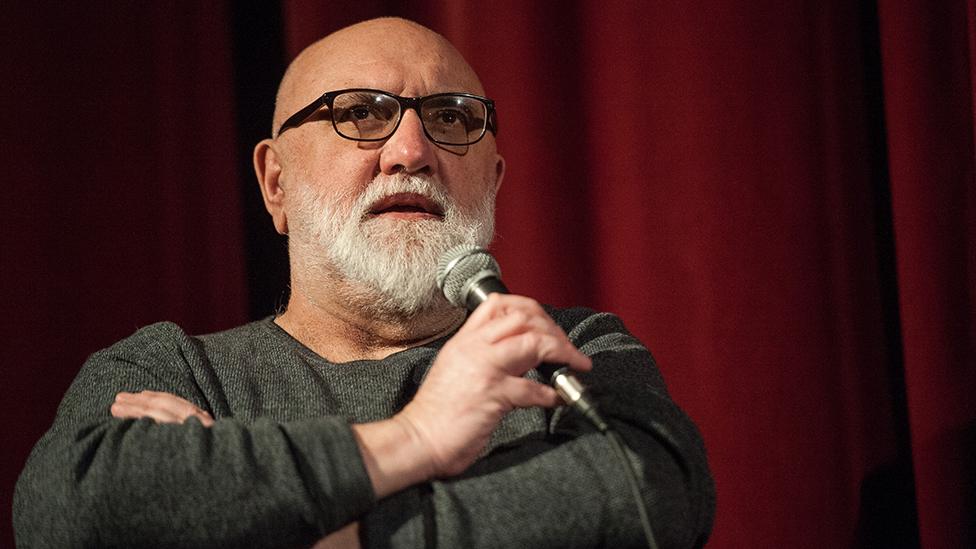
Actor, comedian and author Alexei Sayle says criticising Israel's actions has cost him friendships
The 71-year-old actor, comedian and author - whose mother was Jewish and grew up in an Orthodox, Yiddish-speaking household - has been a long-time campaigner for Palestinian rights. It is a contingent that represents a small minority of British Jews.
Mr Sayle says Jews who choose to publicly criticise Israel's actions sometimes feel a sense of guilt and often pay a price for their stance.
"It's cost me friendships, it's made relationships with people difficult, sometimes it's made me feel uncomfortable to speak out for the Palestinian people. It's painful," Mr Sayle says.
Referring to the "river to the sea" chant, he insists it is not meant to mean the eradication of Jews in the region.
But while he fully understands the need for Jews to have somewhere they feel safe, he acknowledges that he, and other campaigners, are calling for a change in the way Israel sees itself as a Jewish country.
"I think that to have a state called Israel, which has a right of return and is a state in which Jews live in beautiful harmony with everybody else, is fine," Mr Sayle says.
"But if that safe haven depends on brutalising other people, stealing other people's land, then it's not a safe haven," he says, challenging Israel's assertion that its actions are necessary to maintain security.

More on Israel-Gaza war
Follow live: Latest updates
Watch: Video said to show Al-Quds hospital after nearby blast
Explained: What is happening in Israel and Gaza, and why now?
History behind the story: The Israel-Palestinian conflict

While there is debate over the nature and intent of some slogans at demonstrations, a huge rise in incidents of anti-Jewish hate in the UK of the past few weeks is irrefutable. Similar spikes in antisemitic incidents accompanied Israel-Gaza violence in 2009, 2014 and 2021.
"We are unfortunately used to it to some extent, but we do feel that we should be feeling safer here in England, children should feel comfortable to come to school in the morning and not get harassed," says Abraham Schechter, headteacher of the Beis Chinuch Lebonos Jewish Girls School in north London.
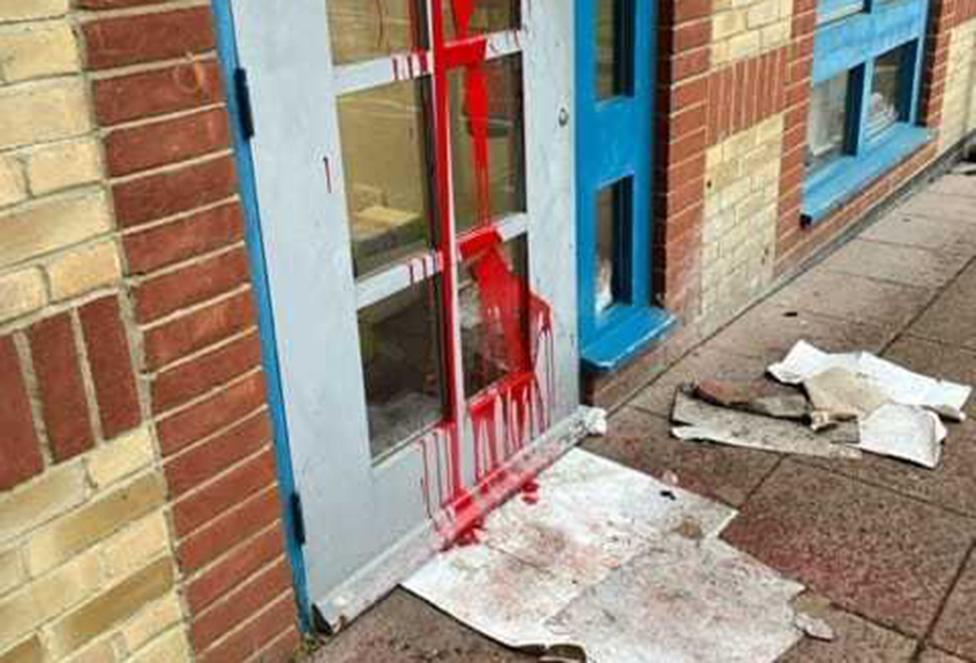
Red paint thrown over a door at a Jewish school in London
Staff and students arrived at school one morning to find red paint had been thrown at the front gates. Another Jewish school close by was also vandalised in a similar way.
"Everybody's very tense, very worried, especially the pupils. We had discussions telling them not to loiter around on the streets and just to go straight home [after school], but they should not suffer here for what is happening over there," Mr Schechter says.
There are concerns that the longer the conflict goes on, the more intensely and profoundly it will affect British Jews right across the spectrum.
Additional reporting by Harry Farley

Have your family or friendship groups had disagreements over the Israel-Gaza war? You can get in touch by emailing haveyoursay@bbc.co.uk, external.
Please include a contact number if you are willing to speak to a BBC journalist. You can also get in touch in the following ways:
WhatsApp: +44 7756 165803
Tweet: @BBC_HaveYourSay, external
Please read our terms & conditions and privacy policy
If you are reading this page and can't see the form you will need to visit the mobile version of the BBC website to submit your question or comment or you can email us at HaveYourSay@bbc.co.uk, external. Please include your name, age and location with any submission.
Related topics
- Published31 October 2023
